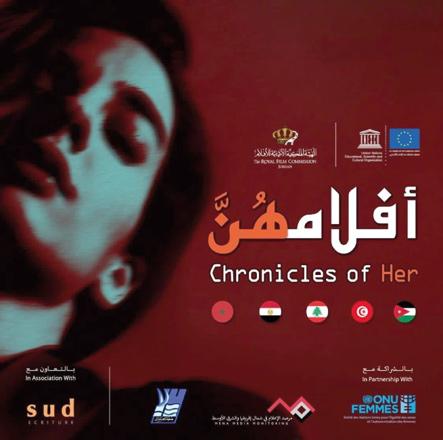- Local News
- Sun-2020-12-13 | 02:56 pm

Nayrouz News Agency :
Tied together by stories dealing with gender equality, domestic violence and discrimination against women, the Pan-Arab feature-length anthology film "Chronicles of Her” premiered online on December 10, aiming at raising awareness about key gender-related issues.
The anthology film was produced in the framework of the Royal Film Commission’s (RFC) capacity building programme titled "Anthology Film: Women in the Maghreb-Mashreq Region” in cooperation with UNESCO and with support from the UN, according to "Chronicles of Her” film’s Facebook page.
This anthology brings together five stories from five Arab countries, including Jordan, Tunisia, Lebanon, Egypt and Morocco, each of which dealt with gender equality, equal access to education, decent working conditions, domestic violence, physical abuse, discrimination against women, in addition to the representation in the political and economic decision-making process, according to a statement sent to The Jordan Times by the Royal Film Commission (RFC).
The portmanteau film gears towards providing capacity reinforcement for all filmmakers involved in the production of "Chronicles of Her”, which aims to raise awareness through deliberately showing stereotypical archetypes, to integrate a gender responsive approach in film production in the Maghreb-Mashreq region, the statement added.
Regarding the timeline and phases of the programme, two film experts, a writing and directing mentor and a producing mentor, worked with the selected teams online, guiding them all the way from script development to realising their films.
The online mentorship commenced in April, while shooting took place between July and September 2019, with the mentors making visits to each of the film sets.
Each story, represented by a producer-director team was granted a fund of €10,000 to be produced into a film, according to the statement.
The premiere of "Chronicles of Her” was set to take place in Amman in March 2020, but due to the pandemic, the event was postponed and was decided to be screened online, the statements said, adding that "following the premiere, the film will be distributed by the RFC to international, regional and local festivals”.
Throughout the course of the programme, a total of 286 persons worked towards achieving the programme’s goals, of whom 97 were females amounting to about 34 per cent of the total number of people, according to the statement.









